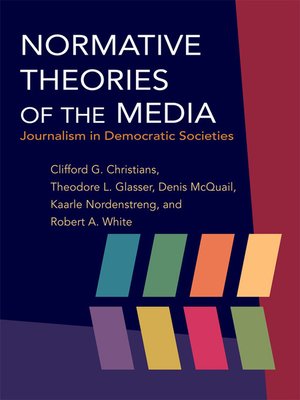Normative Theories of the Media
ebook ∣ Journalism in Democratic Societies · The History of Media and Communication
By Clifford G Christians

Sign up to save your library
With an OverDrive account, you can save your favorite libraries for at-a-glance information about availability. Find out more about OverDrive accounts.
Find this title in Libby, the library reading app by OverDrive.



Search for a digital library with this title
Title found at these libraries:
| Loading... |
In this book, five leading scholars of media and communication take on the difficult but important task of explicating the role of journalism in democratic societies. Using Fred S. Siebert, Theodore Peterson, and Wilbur Schramm's classic Four Theories of the Press as their point of departure, the authors explore the philosophical underpinnings and the political realities that inform a normative approach to questions about the relationship between journalism and democracy, investigating not just what journalism is but what it ought to be. The authors identify four distinct yet overlapping roles for the media: the monitorial role of a vigilant informer collecting and publishing information of potential interest to the public; the facilitative role that not only reports on but also seeks to support and strengthen civil society; the radical role that challenges authority and voices support for reform; and the collaborative role that creates partnerships between journalists and centers of power in society, notably the state, to advance mutually acceptable interests. Demonstrating the value of a reconsideration of media roles, Normative Theories of the Media provides a sturdy foundation for subsequent discussions of the changing media landscape and what it portends for democratic ideals.|
Contents
Preface
Introduction
1. Beyond Four Theories of the Press
Part One: Theory
2. Evolution of Normative Traditions
3. Characteristics of Normative Theory
Part Two: Democracy
4. The Principles and Practice of Democracy
5. Roles of News Media in Democracy
Part Three: Roles
6. The Monitorial Role
7. The Facilitative Role
8. The Radical Role
9. The Collaborative Role
Prospects
10. Media Roles under Challenge
References
Index
|
[The contributors] see four roles for the press: a monitor of events in the world, a facilitator of democratic decision making, a radical communicator free of any restraint, and a collaborator with those in power. Each of these four is explained in detail, with many excellent examples. . . . Highly recommended."—Choice
|Clifford G. Christians is research professor of communications and the director of the Institute of Communications Research at the University of Illinois at Urbana-Champaign. Theodore L. Glasser is a professor of communication at Stanford University. Denis McQuail is a professor emeritus of mass communication at the University of Amsterdam. Kaarle Nordenstreng is a professor of journalism and mass communication at the University of Tampere, Finland. Robert A. White is a professor of social sciences and communications at St. Augustine University of Tanzania.
|Clifford G. Christians is research professor of communications and the director of the Institute of Communications Research at the University of Illinois at Urbana-Champaign. Theodore L. Glasser is a professor of communication at Stanford University. Denis McQuail is a professor emeritus of mass communication at the University of Amsterdam. Kaarle Nordenstreng is a professor of journalism and mass communication at the University of Tampere, Finland. Robert A. White is a professor of social sciences and communications at St. Augustine University of Tanzania.






